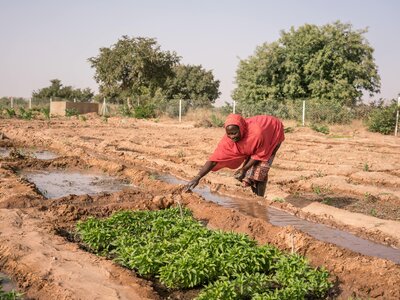Niger
- 52%
- of people live below the national poverty line
- 50%
- of children under 5 are chronically malnourished
- 27 million
- population
Niger is a landlocked country in the Sahel. With nearly 80 percent of its population living in rural areas, soil degradation and limited access to arable land and water are major drivers of food insecurity. With erratic rainfall, rising temperatures, desertification, and frequent droughts and floods, Niger loses nearly 100,000 hectares of productive land each year.
Multiple, interconnected crises have eroded communities' resilience, leaving millions in acute need. Persistent conflict, climate shocks, economic instability continue to exacerbate humanitarian needs, particularly in regions where livelihoods have been severely weakened by recurrent shocks.
About 2.4 million people are acutely food insecure in Niger and about 1.2 million children in Niger suffer from moderate acute malnutrition and 400,000 from severe acute malnutrition.
The Government remains committed to its national development priorities, which aim to reduce poverty and food insecurity while building climate resilience through sustainable agricultural development.
The World Food Programme (WFP) provides both short-term relief for vulnerable communities and long-term solutions through its integrated resilience programme and social protection systems. WFP works in partnership with the Government, UN agencies and civil society organizations.
What the World Food Programme is doing in Niger
-
Emergency preparedness and response
-
WFP provides vital food and nutrition assistance to crisis affected population, including internally displaced people, refugees and their vulnerable host communities, as well as to migrants and severely food insecure households. WFP also invests in extreme weather preparedness by timely engaging communities in planning, readiness and anticipatory actions, in response to extreme events like floods. In 2025, WFP’s crisis response reached over 1.5 million people through food or cash and voucher transfers. Assistance to over 600,000 protracted food insecure people was suspended as of May 2025. Priority was given to newly displaced households.
-
Adaptative social protection
-
Climate-sensitive livelihoods and asset creation
-
Support for smallholder farmers
-
School meals
-
Nutrition
Niger news releases
Go to pagePartners and donors
Find out more about the state of food security in Niger
Visit the food security analysis pageOperations in Niger
Contacts
Office
Rue du Fleuve, Niamey, Niger
Niamey
Niger






